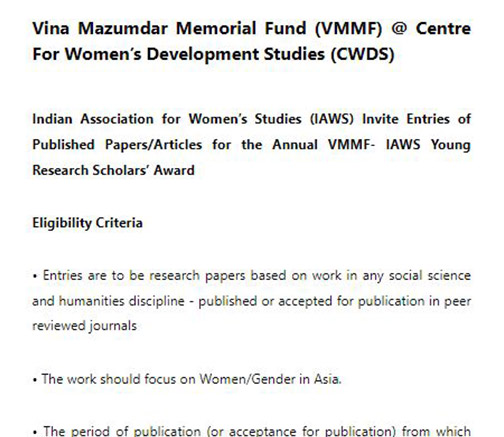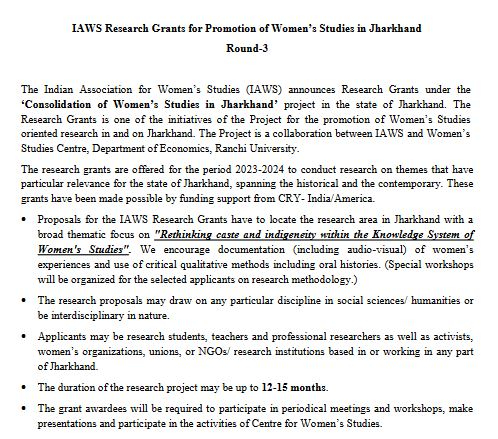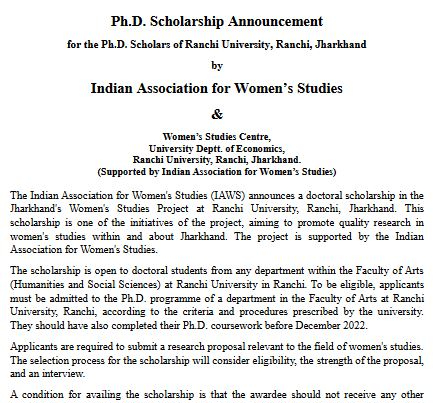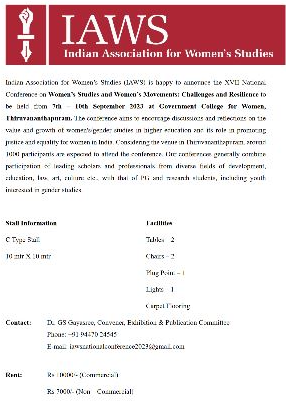Announcements
Indian Association for Women’s Studies XVII th National Conference September 7-10, 2023 Thiruvananthapuram
Women’s Studies and Women’s movements: Challenges and Resilience
Concept Note:
“ There are three ingredients I see in an Indian perspective for women studies: (a) acceptance and recognition of Indian society as a plural society so that we do not speak only for a particular class (b) recognition that women must fight not only for their future but in the very shaping of the future of the society of which they are a part, which means women must be involved in all political, social, economic process and at all levels and (c) that research and policy have to be pro-woman ideological commitment to change the position of women in society for the better.”( Vina Majumdar, 1986) Speaking at the first Women’s Studies Conference in India (1981), she described women’s studies as having a critical perspective which “made participants feel that they were taking part in a movement and not just a conference” (Vina Mazumdar , Presidential Address, Xth National Conference, IAWS,2000).
Women’s Studies as a critical discipline of the women’s movement have over the years foregrounded women’s visibility and engendered the lived realities of women, offering theories and perspectives to recognize multiple patriarchies at work, and strategies for empowerment and resistance. Women’s Studies and women’s movement since its inception stood for marginalised section of women in particular and pluralism was part of its understanding. To keep it sharp as the tool for change, regular review of pedagogical practices retained the needed connection between theory and politics, academic rigour and activism, and the essential criticality in the discipline. Women’s studies has generated knowledge facilitating greater inclusion of women in the higher education system, confronting the conservative/reactionary forces for greater space and claim within institutions. Through challenging patriarchal structures and epistemological processes, the discipline has been opening up spaces and enabled processes for making claims to constitutional rights. However challenges have come in the way. The learning from women’s movement as well as the broader social and political movements of the country and the world particularly of the Asian countries has loosened to some extent over time. The institutionalized discipline now faces the challenges of depoliticization, women looked upon as beneficiary approach, and professionalization that limits the subversive potential of women’s studies. There is a growing binary between activism and theory, and women studies is fast losing its original connect with the women’s movement. rather has been more connected to state policies in the recent past. This connection is also a fallout of women’s movement seeking to policies.
Women are continued to be looked upon as beneficiaries in development and initial efforts were focused on separate targeted activities for women in the path of affirmative actions. While many of these efforts produced positive results, the potential for bringing about the types of structural changes required for achieving gender equality was therefore reduced. In the 1980s a new approach evolved, the gender mainstreaming strategy, which aimed to make the goal of gender equality central to all activities. The term mainstreaming came from the objective to bring attention to gender equality into the mainstream of all activities. Mainstreaming involves taking up gender equality perspectives as relevant in analysis, visibility of gender in indicators and data collection, particularly with respect to work, and other knowledge construction and dissemination activities, to ensure that all processes take into account the contributions, priorities and needs of the entire stakeholder group, women, men and sexual minorities. Attention to the goal of gender equality needs to be mainstreamed into research, analysis, policies and programmes academia as well as operational activities. With a country as large as India, one is bound to witness plural and diverse social movements which are often impacted and influenced by local histories and folklore. From Jammu and Kashmir through the forest heartlands of Chhattisgarh, Jharkhand to Kanyakumari and from Kutch to the north east region of India women’s movement went through various historical backgrounds, different strains of oral traditions but never ever in a homogeneous manner. Past histories of struggles by women - or for women, are evident when we sieve through narratives by women belonging to traditional women’s societies/associations and collectives. New forms of women’s movement have become prominent in farming activities and different sectors of working women. New changes have also come in the lives of women where women are breaking stereotypes, particularly in science, technology, engineering and management (STEM). The experiences of breaking stereotypes are also to be understood, analysed and to be taken forward. Women’s movement was never isolated from the broader call for humanity, peace, and basic rights of people in general. This is the richness of women’s movement and women’s studies in India.
Over the last decade and more, especially since the adoption of neo-liberal policies, gender mainstreaming threw more challenges than solutions. Trends with regard to women’s employment have posed serious questions to scholars seeking to study the complex interconnections between economic growth, development policies, and women’s status. There has been a visible decline in women’s work participation rates over the last decade and more. The sectors in which women find work, as also the conditions in which such work is available have on the one hand underscored the need for deeper analysis. Furthermore, these trends have triggered both organized and sporadic struggles on the ground. In the face of the contemporary crisis of dispossession, loss of access and control to livelihood options, and a visible impoverishment in the face of the economic slowdown, the shrinking opportunities of work have hit women in specific ways. The violation of existing legal frameworks governing labour has acquired a special meaning during the pandemic when the phenomenon of retrenchment and dispossession has gained momentum. The issues of women’s loss of livelihood and work assume far greater primacy in situations when millions amongst the labouring poor are faced with hunger, malnutrition, and even death due to extreme poverty. The Covid lockdown has exposed the vulnerability of all labouring people.
The process of knowledge generation has over the last several decades, built up a rich repertoire of scholarship to advance analysis of the broader context and tools to understand the linkages between power, and domination which maintain relations of exploitation and unequal distribution and control over public resources. A continued dialogue between the women’s movement and women’s studies is crucial to understanding and resist the dispossession and violence in women’s lives. Looking through the lens of challenges and resilience is expected to provide an answer to the much awaited question: what is to be done.
The conference looks forward to dialogues and discussions to fasten the bridge between knowledge base and struggle, between social, political, economic, cultural contexts and the axes of power shaping patriarchy. The conference will flag off the issues with policies in education, health, and labour along with discussions on peace and ecology. There will be ten Subthemes focussing on the different aspects of the lead question. There will also be Plenaries and Panels with special focus. Participation in the conference would mean sharpening our critical perspective and mobilising for movement and struggle for equality.
The Conference theme will be divided into 10 Subthemes :
Subtheme 1: Women in freedom movements: Safeguarding Constitution , struggles and solidarity
Subtheme 2: Women’s dislocations and livelihood struggles: Pandemic and Post pandemic Contexts
Subtheme 3: Contemporary Women’s movements: Grassroots, New forms, Strategies, and Challenges
Subtheme 4: Climate Change and women : Ecological Sustainability and Resilience
Subtheme5: Women in Science Technology Engineering and Mathematics (STEM) and Building Scientific Temper
Subtheme 6: Local Self Governance and women: Prospects and Challenges
Subtheme 7: Intersectional Vulnerabilities: Caste, religion, Trans and sexual minorities, Adivasis/Tribes and disability
Subtheme 8: Human rights Violations: Gender Based Violence and Resistance
Subtheme 9: Legal Reforms, Judicial system and Emancipatory Agenda
Subtheme 10: Gender and Digital Space, New Media and Popular Culture
Plenaries:
Plenary1: Asia Panel-Women’s Movements for Peace and Democracy in Asia
Plenary2: Host State Panel-Women’s Movements in Kerala
Plenary 3: Theme Plenary
Plenary 4: Gender and Education-Disparities and Inclusion
Plenary5: Looking Back: 50 years since Towards Equality
There will also be several Panels and a Student’s Programme in Pre-Conference Call For Papers for the Subthemes will be released soon.





